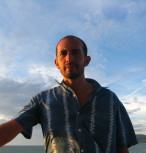DNA reveals the past and future of coral reefs
New DNA techniques are being used to understand how coral reacted to the end of the last ice age in order to better predict how they will cope with current changes to the climate. James Cook Univer

From 2005 to 2022, the main node of the ARC Centre of Excellence for Coral Reef Studies was headquartered at James Cook University in Townsville, Queensland (Australia)








Abstract: Overfishing and climate change threaten global marine biodiversity and fisheries. Addressing these problems is particularly critical in areas of high species richness and endemicity, such as the Midriff Islands, Gulf of California (Mexico), where livelihoods of coastal communities are threatened by depletion of fish stocks and potential loss of species associated with climate change. In collaboration with researchers, agencies and local NGOs, we are designing a network of marine reserves for this priority conservation area and major fishing region. The project aims to develop a practical approach to design networks of marine reserves that consider ecological connectivity and the effects of climate change. We are following a systematic conservation planning approach to ensure the network achieves conservation objectives, while minimising costs to fisheries.
Bio: Jorge’s broad interests regard planning for the sustainable use of natural resources to achieve biodiversity conservation and development objectives. He is interested in contributing to further develop systematic conservation planning theory and practice through the integration of terrestrial and marine conservation planning initiatives. His research explores theoretical and methodological aspects of key decision-making problems associated with a land-sea approach, such as integrating cross-system threats (e.g. how land-based threats affect marine and coastal spatial prioritization), identifying co-benefits and trade-offs associated with management decisions (e.g. spatial congruence between local and downstream land values), and improving collaboration among diverse stakeholders. His work on marine planning includes developing practical approaches to designing marine reserve networks considering ecological connectivity and the effects of climate change.
New DNA techniques are being used to understand how coral reacted to the end of the last ice age in order to better predict how they will cope with current changes to the climate. James Cook Univer
A new study on the effects of climate change in five tropical countries has found fisheries are in more trouble than agriculture, and poor people are in the most danger. Distinguished Profess
James Cook University researchers have found brightly coloured fish are becoming increasingly rare as coral declines, with the phenomenon likely to get worse in the future. Christopher Hemingson, a
Researchers working with stakeholders in the Great Barrier Reef region have come up with ideas on how groups responsible for looking after the reef can operate more effectively when the next bleaching
Abstract: As marine species adapt to climate change, their heat tolerance will likely be under strong selection. Individual variation in heat tolerance and its heritability underpin the potential fo
Abstract: The Reef Ecology Lab in KAUST’s Red Sea Research Center explores many aspects of movement ecology of marine organisms, ranging from adult migrations to intergenerational larval dispersal
Abstract: Macroalgal meadows are a prominent, yet often maligned component of the tropical seascape. Our work at Ningaloo reef in WA demonstrate that canopy forming macroalgae provide habitat for ad
Abstract: Sharks are generally perceived as strong and fearsome animals. With fossils dating back at least 420 million years, sharks are not only majestic top predators but they also outlived dinosa
Abstract: Connectivity plays a vital role in many ecosystems through its effects on fundamental ecological and evolutionary processes. Its consequences for populations and metapopulations have been
Abstract: Evolution of many eukaryotic organisms is affected by interactions with microbes. Microbial symbioses can ultimately reflect host’s diet, habitat range, and even body shape. However, how
Abstract: The past few years have seen unprecedented coral bleaching and mortality on the Great Barrier Reef (GBR) but the consequences of this on biodiversity are not yet known. This talk will expl